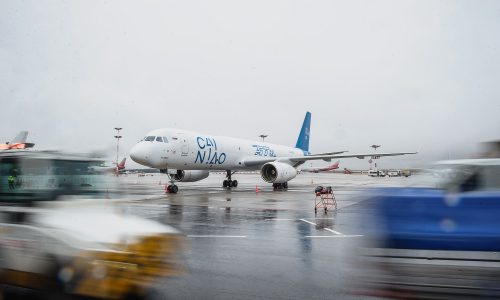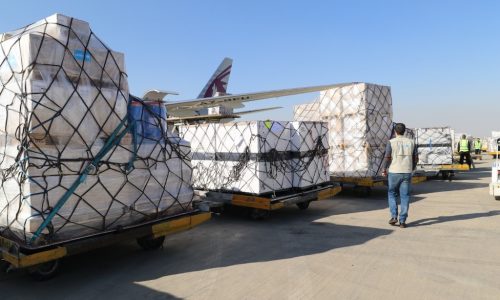Granting temporary traffic rights for additional cargo operations from outside the EU
Temporarily remove night curfews and/or slot restrictions at airports for essential air cargo operations
Facilitate the use of passenger aircraft for cargo-only operations
The European Commission has called on European Union Member States to support air cargo operations during the coronavirus crisis.
The new guidance recommends operational and organisational steps to keep essential transport flows moving, including medical supplies and personnel.
Commissioner for Transport Adina Vălean declared: “Air cargo amounts to approximatively 35% of the world trade by value, and is a key part of freight transport. It keeps global supply chains functioning for many of the most high value materials and it is a critical complement to the transport of freight by land and sea.
“We provide concrete measures to keep such services running, including on passenger planes. Time-sensitive products, such as medicines, need to be flown. The guidelines adopted today have also recommendations on removing or showing flexibility in night curfews or slot restrictions at airports, and also special measures for air cargo personnel.”
The measures include inviting Member States to grant temporary traffic rights for additional cargo operations from outside the EU if restrictions would normally apply, even if these cargo operations are conducted with passenger aircraft.
Member States are also advised to temporarily remove night curfews and/or slot restrictions at airports for essential air cargo operations, and to facilitate the use of passenger aircraft for cargo-only operations. Aircrew flying the aircraft should be exempted from travel restrictions if they do not show symptoms.
An EC spokesperson said: “It is crucial that open airports have sufficient capacity to handle air cargo, and put in place special measures for transport personnel involved in the transport of goods.These exceptional measures will be temporary for the duration of the coronavirus crisis.
“Any restrictions incompatible with Union law must be lifted. The Commission is also calling on all third countries to refrain from unnecessary restrictions on air cargo operations, in particular those incompatible with agreements in place.
“This is in the common interest of supply chain continuity for goods, including essential ones, such as highly specialised, urgent and critical products such as medical supplies.”
CLECAT, the European association for forwarding, transport, logistics and customs services, commended the European Commission for the” speedy release” of the guidance document.
CLECAT members are responsible for handling 95% of all air cargo and are, as such, the vital link between exporters/importers of goods and transport operators, such as air carriers.
As recognised by the European Commission in its guidance document, the outbreak of COVID-19 is threatening the functioning of air cargo transport, which in turn affects the entire EU and global economy due to disruptions to the supply chain.
CLECAT stresses that continued and uninterrupted air cargo services are of essential strategic importance for the European Union and its economy, as well as the public health, especially due to the nature of goods transported by air cargo, which includes time-sensitive products, such as medical supplies.
“The guidance document issued by the European Commission contains highly valuable recommendations, which, if implemented speedily by Member States, will support air cargo operations and ensure the functioning of vital global supply chains. Therefore, CLECAT calls on the EU Member States to implement the measures set out by the European Commission as a matter of urgency, to ensure the flow of essential goods by air transport”, commented Ms Nicolette van der Jagt, Director General of CLECAT.

